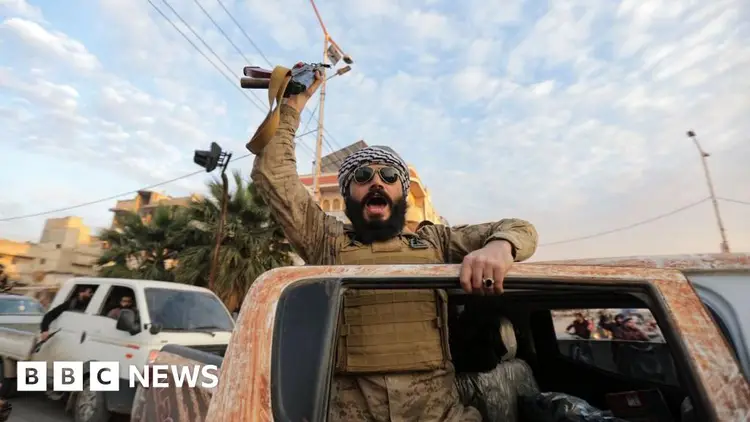Thousands flee Syrian city Homs as rebels advance further

Thousands of individuals are escaping from Homs, Syria's third-largest city, as news spreads that rebel forces are approaching. This comes just over a week after the rebels began their rapid assault.
On Thursday, the rebels took control of Hama in the north, marking another significant setback for President Bashar al-Assad, who had already lost Aleppo the previous week.
The head of the Islamist militant group Hayat Tahrir al-Sham (HTS), Abu Mohammed al-Jawlani, informed the people of Homs that "the moment you've been waiting for has arrived."
Last week, opposition groups launched their largest assault on the Syrian government in several years.
They have been moving southward, and Homs is set to be the next destination on the way to the capital, Damascus.
Their attack marks the fastest advance by either side on the battlefield since the start of the Syrian civil war 13 years ago, revealing the vulnerabilities of the nation's military forces.
Frightened members of President Assad's Alawite minority group are hastily trying to escape Homs, as videos reveal traffic congestion filled with vehicles.
The rebels' command center has announced that their troops have moved through two towns, Rastan and Talbisseh, and are now just 5 kilometers (about 3.1 miles) away from Homs.
The BBC has not confirmed these movements, but the Syrian Observatory for Human Rights (SOHR), a conflict monitoring organization based in the UK, is also reporting on them.
Previously, the Syrian Observatory for Human Rights reported that Russian aircraft targeted a bridge in Rastan in an attempt to hinder the progress of the rebels.
After the Syrian military failed to maintain its hold on Hama after several days of conflict, it's uncertain if they can successfully protect Homs.
Homs is a crucial city that connects Damascus with the Alawite stronghold along the Mediterranean coastline.
The Alawites are a small sect within Shia Islam, and they are the group from which the Assad family comes.
They have been a crucial source of support for Assad's rule for a long time, playing an essential role in helping the president maintain his authority.
Assad has promised to "defeat" the insurgents and has blamed Western countries for attempting to reshape the area's boundaries.
However, experts indicate that his troops are lacking motivation and are struggling with insufficient wages and corruption within their ranks. Recently, he declared a 50% increase in their salaries, as reported by the state news agency SANA.
Russia and Iran, the key partners of the regime, have announced their ongoing backing for Assad.
However, they haven't offered the type of military support that has been sustaining his leadership until now, and Moscow is currently encouraging Russian citizens to exit the country.
The Kremlin is focused on its conflict in Ukraine, while Iran has been significantly weakened due to Israel's aggressive actions against its strongest ally, Hezbollah in Lebanon.
Hezbollah, which played a crucial role in maintaining control over areas in Syria, is now mostly missing from the fighting. However, reports from Lebanese and Israeli media indicate that a few members have crossed the border to help reinforce the defenses in Homs.
Russian and Iranian officials are scheduled to meet with Turkish representatives this weekend to talk about how to address the recent increase in violence in Syria's civil war.
Turkey supports several rebel factions, and President Recep Tayyip Erdogan has been urging Mr. Assad for months to find a political resolution with the opposition.
He has expressed his backing for the rebels' latest progress, stating that the offensive wouldn't have taken place if Assad had heeded his appeals.
Experts believe that it is highly unlikely this could have occurred without the awareness and consent of Ankara.
Abu Mohammed al-Jawlani, the head of HTS, has been speaking out lately to improve his reputation and put both Syrians and international leaders at ease.
He has highlighted that he broke away from Islamic State and Al Qaeda several years ago, portraying himself as a nationalist who is against carrying out assaults beyond Syria. He has also pledged to safeguard minority groups.
Since the outbreak of civil war in 2011, over 500,000 lives have been lost as a result of the violent response from Assad's government to peaceful demonstrations advocating for democracy.
According to the Syrian Observatory for Human Rights, over 820 individuals have lost their lives throughout the country in the nine days since this military operation started. Among the dead, 111 are reported to be civilians.
Previously, HTS fighters and their supporters captured Hama and freed prisoners from the central jail during intense fighting, while the military announced that it had moved its troops away from the city.
Hama is a city with a population of one million and is located 110 kilometers (70 miles) south of Aleppo, a city that was taken by rebels just last week.
In the meantime, the UN has indicated that the ongoing conflict is further deteriorating an already terrible situation for the civilians in the northern part of the country.
Approximately 280,000 individuals have been forced to leave their homes, primarily consisting of women and children, with some civilians stuck in active conflict zones and unable to escape to safer places.
In Aleppo, a city with a population of two million, many essential services and facilities—such as hospitals, bakeries, power plants, and water, internet, and telecommunications—are struggling or not working at all due to a lack of supplies and staff.
UN Secretary-General Antonio Guterres called on "everyone with the power to help" to contribute to ending the civil conflict.



































































